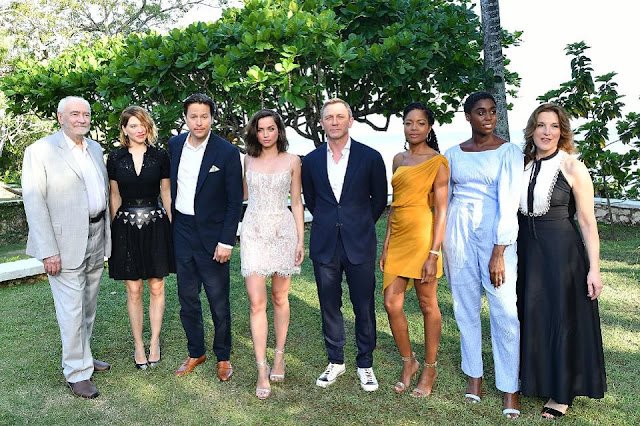The Problem with Movie Franchises
Hollywood's franchises become the "biggest" movies of the world, although they continue to show that you can spoil a good thing by over-doing it
 |
| 'The Pink Panther' 1963 (CREDIT: MGM/United Artists Releasing) |
by Jack Linsdell
Ever since the dawn of Hollywood in American moviemaking, studios have always released the films for the masses - namely the ones with the higher budgets, cinematic spectacle and fantastical entertainment value which became known as the "summer blockbuster". Today, these films still exist (albeit all year round now) and are important because their multi-million dollar box office totals give studios the money to fund the smaller, indie films we critics/movie lovers all enjoy. And, you all will have friends/family who don't follow movies like you and these blockbusters are the ones they are therefore most likely to know about/go and see. So, the blockbusters are an important element of the movie marketplace - but not the only part.
A franchise/movie series often stems from a financially "leggy"/successful, critically "buzzy" original film that offers something unique. For example, Dr. No gave 1962 audiences an action/spy flick with an explicit womanising/alcoholic leading character, Doug Liman's The Bourne Identity gave post-9/11 audiences a more relatable action hero grounded in our 'real' world and Blake Edward's The Pink Panther was a cartoonish, goofy, heist caper that wasn't afraid to have a laugh at itself. The point being is that all franchises often start with a well-liked, ground-breaking original (think the original Star Wars), often improving themselves with a second instalment (From Russia With Love comes to mind) before starting to peter out/lose their true identity as we get a flood of films with a priority of commercial exploitation rather than artistic integrity. I ask you, how many series/trilogy's/franchises can you honestly say have remained consistently high-quality? For me, the nearest example is the Bourne series (including The Bourne Legacy and most recent Jason Bourne, which are both decent instalments in the franchise despite what critics might say otherwise), but mostly they lose themselves.
Indeed, with every series comes conflicts between writers/directors/producers/stars/studios or a combination of some or the other in what direction articstically these sequels/spinoffs should go. When they tire, a studio will indulge in a spinoff/side-quel (think The Bourne Legacy, Men in Black International and the upcoming Charlie's Angels reboot) to continue reaping financial benefits from existing properties. Think the feud between Matt Damon/Paul Greengrass with Tony Gilroy in the Bourne series, clashes between Bond producers Harry Saltzman and Albert R. Broccoli or conflicts with Zack Synder and the DC Films brand. These so named conflicts/issues do result in poorer quality instalments because of all the behind the scenes drama, but it's a shame that whoever's responsible for changing artistic direction in a series, does so.
Let's take 1963's The Pink Panther, which was so successful, especially Peter Seller's portrayal of the iconic, stupid and foolhardy Inspector Clouseau who became the protagonist for the rest of the series (David Niven's character was originally intended as the main star, getting top billing on the credits). This cult classic is a master, with Blake Edward's proving himself to be a comedic, cinematic master with excellent long takes, pinpoint framing and having an excellent narrative wise eye too. Seller's performance is hiralious, the ending twist is unforeseen and a delight and there are some standout sequences that even today remain gut-wrenchingly funny - see the long scene of men hiding under his wife's bed in their hotel room and the old man watching a car chase on a street corner. The second instalment Shot In The Dark was a Seller's vehicle completely, and was not written as a Pink Panther film - instead Edward's adapting a serious crime play by swapping the detective for Clouseau and adding in the gags/humour. It's darker, sophisticated narrative roots do elevate the quality of this sequel, whilst Edward's continues Sellers's loveable detective characterisation and gags to keep it in line with it's originally. When both returned to the series over ten years later after a feud between them both (Seller and Edwards), The Return of The Pinker Panther spelled trouble for a series that went on to become too goofy, lacking any coherent story or character and generally becoming messy movies. Not even the humour is funny.
The Pink Panther series is just one demonstration at how the original flick can be ruined when conflicts/timing delays cause sharp shifts in tone/narrative/performance directions, that take it away from how well the original was made. Indeed, although the series is iconic and was popular until instalment six (give or take), it's clear that oversaturation and a hesitance to do anything other than rehash the first film's gags/narrative (six of the series revolve around the Pink Panther gem stone) ruined what all involved originally accomplished. My question is this; is it worth ruining what you've established artistically for the sake of personal/corporate financial capitalisation? It's a complex question that cannot solely be attributed to the filmmaker but nonetheless it's an interesting one to ask.
So, if you have never seen The Pink Panther and it's sequel A Shot in The Dark (with an amazing one-take opening sequence), then do divulge in these two - they are delightful. But every time you watch you favourite franchise/movie series, do come to a decision. Did they ruin the original (s) you love so much by overdoing it, or is it one of the exceptions to the rule that remained artistically successful throughout?


Comments
Post a Comment